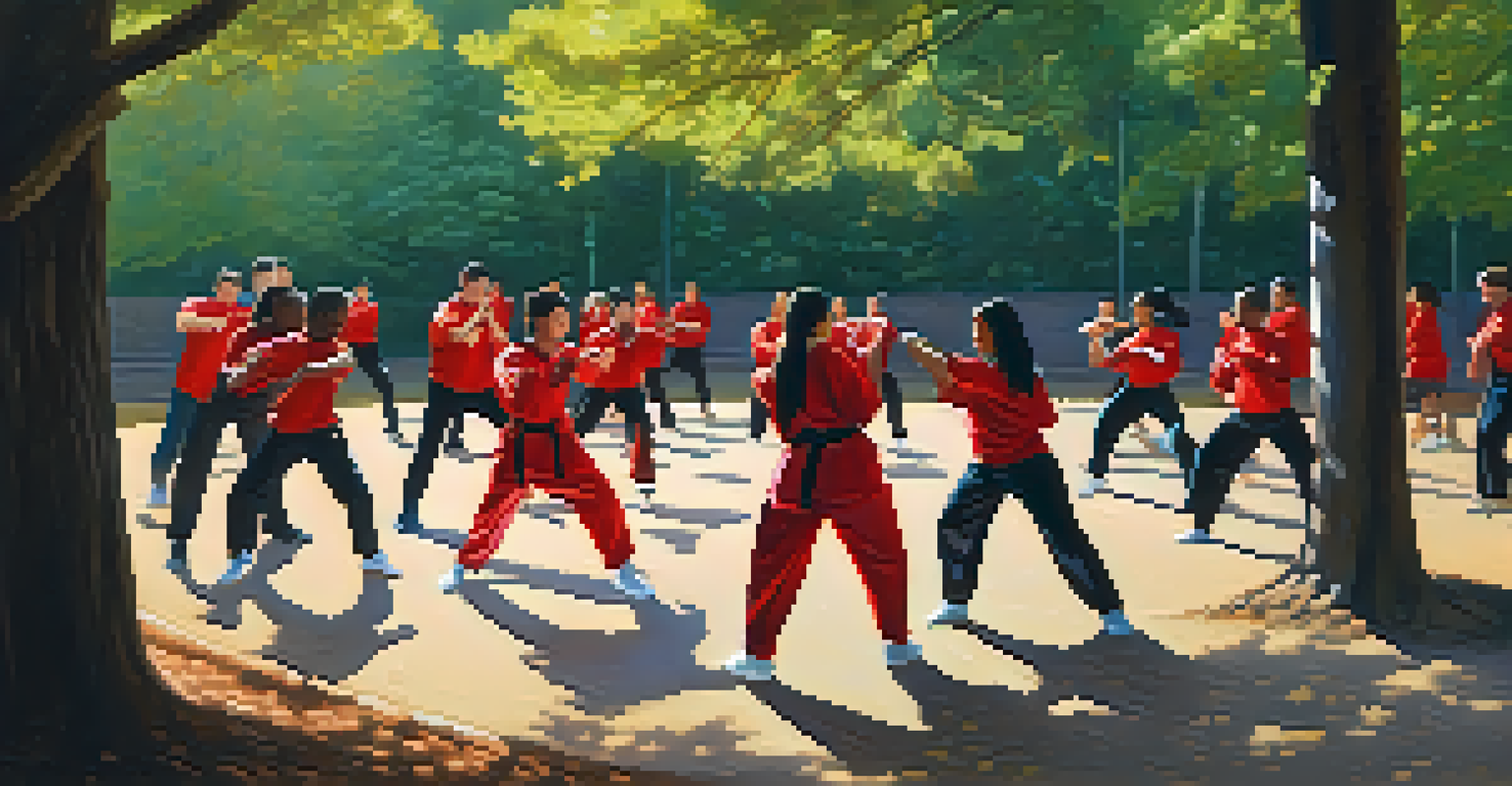Emotional Awareness: A Key to Self Defense Preparedness

Understanding Emotional Awareness in Self-Defense
Emotional awareness is the ability to recognize and understand your emotions as well as those of others. In self-defense, this skill is crucial because it helps you gauge situations more accurately. For instance, being aware of your anxiety level in a tense situation can guide your response, whether to engage or retreat.
Awareness is the first step to change.
When you have a clear understanding of your emotions, you can better control your reactions. Imagine walking down a street and sensing that something feels off; your gut feeling might be tied to your emotional awareness. Recognizing these feelings can prompt you to stay alert or change your path, potentially avoiding danger.
Moreover, emotional awareness helps in reading the emotions of others. This can be invaluable in self-defense, as understanding the intentions of those around you can inform your choices. By honing this skill, you become more adept at recognizing threats before they escalate.
The Role of Anxiety in Self-Defense Situations
Anxiety is a natural response to perceived threats, but it can cloud your judgment. When you're anxious, your mind may race, making it difficult to think clearly or act decisively. For example, if someone approaches you aggressively, anxiety might lead to panic, hindering your ability to assess the situation calmly.

However, understanding and managing your anxiety can turn it into an asset. By acknowledging your feelings, you can leverage them to sharpen your focus. Instead of letting fear paralyze you, you might find that it prompts you to be more vigilant and prepared.
Emotional Awareness Enhances Safety
Recognizing your own emotions and those of others is crucial for assessing and responding to potential threats effectively.
Practicing mindfulness and grounding techniques can help you manage anxiety effectively. Techniques like deep breathing or positive visualization can create a sense of control. When you feel calm, you can make better decisions in high-pressure situations, enhancing your overall self-defense preparedness.
Building Confidence Through Emotional Awareness
Confidence is key when it comes to self-defense, and emotional awareness plays a significant role in building that confidence. When you're in tune with your emotions, you develop a better sense of self-assurance. For instance, if you know how to manage your fear, you're more likely to act decisively when needed.
The greatest weapon against stress is our ability to choose one thought over another.
Additionally, understanding your emotional triggers can help you prepare for various scenarios. If you know that certain situations make you uncomfortable, you can develop strategies to handle them beforehand. This proactive approach not only builds confidence but also reinforces your ability to respond appropriately.
Moreover, practicing emotional awareness can lead to improved self-esteem. When you recognize and validate your feelings, you cultivate a more positive self-image. This shift can translate into how you carry yourself in public, making you appear more assertive and less vulnerable to potential threats.
Recognizing Red Flags in Potential Threats
Emotional awareness can significantly enhance your ability to spot potential threats. By tuning into your instincts and gut feelings, you can identify red flags that indicate danger. For example, if someone’s body language seems aggressive or they maintain an unsettling stare, your emotional awareness can prompt you to take action.
Understanding the emotional cues of others is also crucial in this context. If you notice someone exhibiting signs of distress or aggression, this may indicate that they are more likely to act unpredictably. Your ability to read these cues can be the difference between staying safe or finding yourself in a compromising situation.
Manage Anxiety for Better Decisions
Understanding and managing anxiety can transform it from a hindrance into a tool that sharpens your focus in self-defense situations.
Practicing situational awareness is essential in honing this skill. By observing your surroundings and the emotions of people in them, you can create a mental map of potential threats. This heightened alertness not only helps in avoiding confrontations but also prepares you for effective self-defense if necessary.
The Impact of Stress on Decision-Making
Stress can significantly impair decision-making abilities, especially in high-pressure scenarios. When your body is flooded with stress hormones, it can lead to a 'fight or flight' response, often resulting in hasty decisions. Understanding how stress affects you is the first step in mitigating its impact during self-defense situations.
Emotional awareness can help you identify when you're becoming overwhelmed. By recognizing the signs of stress—such as increased heart rate or shallow breathing—you can practice techniques to calm yourself. This might include stepping back from the situation or employing breathing exercises to regain control.
Ultimately, managing stress through emotional awareness can lead to more rational decisions. By staying grounded, you're more likely to evaluate options thoughtfully, whether that means de-escalating a situation or knowing when to defend yourself. This clarity can be a crucial asset in any self-defense scenario.
Practicing Self-Regulation for Enhanced Preparedness
Self-regulation is the ability to manage your emotions and reactions, particularly in challenging situations. This skill is vital in self-defense, where quick thinking and composed responses can make all the difference. By practicing self-regulation, you can prevent your emotions from dictating your actions during a confrontation.
Techniques such as mindfulness meditation or journaling can help improve your self-regulation skills. Regularly reflecting on your emotional responses can provide insights into your behavior patterns. This knowledge allows you to prepare for potential triggers and respond more calmly in real-life situations.
Empathy Can De-Escalate Conflicts
Cultivating empathy allows you to understand others' emotions, which can help diffuse tense situations before they escalate into physical confrontations.
Incorporating self-regulation into your self-defense training can also enhance your overall preparedness. When you feel in control of your emotions, you can focus on tactical responses rather than being sidetracked by fear or anger. This level of preparedness can empower you to face potential threats with confidence.
Cultivating Empathy in Self-Defense Situations
Empathy, the ability to understand and share the feelings of others, might seem counterintuitive in self-defense, but it can be a valuable tool. Recognizing the emotions of those around you can help de-escalate tense situations before they become physical. By showing empathy, you can often diffuse aggressive behavior simply by addressing the underlying emotions.
For example, if someone seems frustrated or threatened, a calm and understanding approach may lead to a more peaceful resolution. Acknowledging their feelings can shift the dynamic, potentially transforming a confrontation into a conversation. This can save you from having to resort to self-defense tactics.

Moreover, understanding the emotional context of a situation can help you respond more appropriately. If you can empathize with someone's distress, you might find a way to help rather than fight. This approach not only enhances your self-defense skills but also fosters a sense of community and understanding in your interactions.